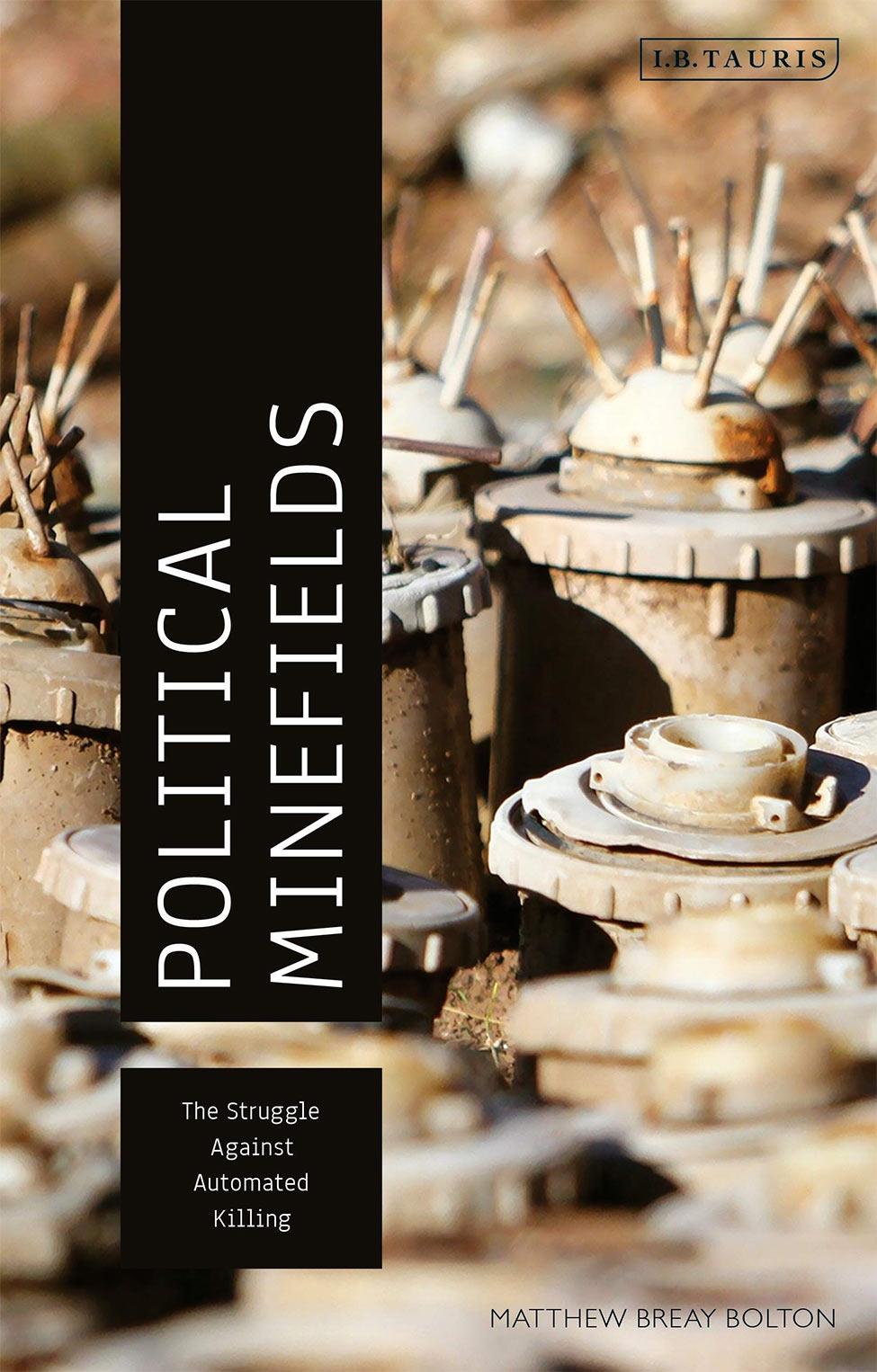

Political Minefields: The Struggle Against Automated Killing
Matthew Bolton, PhD
Associate Professor Of Political Science

What is the central theme of your book?
My book is a political history of explosive traps: landmines, booby traps, unexploded ordnance, improvised explosive devices, automated bombing systems, and killer robots. Listening to survivors, deminers, humanitarians, soldiers, mercenaries, activists and diplomats, I tell stories of people affected by the explosive legacies of war through a sort-of travelogue of the world’s minefields and ordnance dumps.
What inspired you to write this book?
As an aid worker in Bosnia and Iraq in the early 2000s, I lived in mine-affected communities and began working with humanitarian efforts to address the impact of the minefields surrounding me. Later, as an academic, I did research fieldwork in other affected countries: Afghanistan, Bosnia, Cambodia, Croatia, Laos, Sudan, South Sudan, and Vietnam. I’ve also participated in global policymaking processes at the United Nations on a variety of disarmament and arms control issues. This includes landmines, cluster munitions, the arms trade, killer robots and, most recently, the 2017 Nobel Prize-winning International Campaign to Abolish Nuclear Weapons.
I wanted to tell the stories of the people living and working in these extraordinary circumstances. I have learned that we are not passive subjects of politics or technological development. Ordinary people have the capacity to shape the world to be a more humane, just, and peaceful place.
Why is this book important in your field? What does it contribute to the current body of knowledge on its topic?
My field of international relations (IR) often focuses on how competition and security concerns drive people to arms races and violence. But through my research, I have noticed that IR scholars overlook the ways activists and advocates influence how politicians, diplomats, and even soldiers think about weapons. For example, the major military powers have boycotted or stymied the treaties banning landmines and cluster munitions accepted by the majority of the world’s countries. But the treaties have still had a stigmatizing effect; non-signatory governments have shifted their policies to align closer to the global norms and given assistance to survivors and deminers.
There is also a disconnect in IR between studies of the “high politics” of international security diplomacy and those whose lives are actually most insecure. My book shows the impact of treaties negotiated in Geneva, Ottawa and Oslo on people in Phnom Penh, Kabul and Sarajevo. And this relationship is not one way. People from communities affected by landmines and cluster munitions have influenced the creation and implementation of international law on these weapons.
Were students involved in any research related to your book?
In my work on this book and other research on disarmament issues, I am very grateful for the help of Pace University student research assistants. They brainstormed ideas, gathered together news articles, tracked down scholarly literature and checked facts.
Can you share a special moment when writing this book?
I learned so much from travelling in the field with landmine clearance organizations and speaking with deminers, aid workers and mine survivors. One interview, with Tun Channareth, particularly stands out to me. I sat with “Reth,” as he is known, in a beautiful sculpture garden in Siem Reap, Cambodia, and he enthralled me with stories of his activism with the International Campaign to Ban Landmines (ICBL). He protested outside the UN building when the big military powers refused to work toward a ban on the inhumane and indiscriminate weapons that had maimed his body. At the tensest moments of negotiations on landmines in Geneva in 1996, he urged diplomats to remove the “landmines of their hearts” that left them “trapped by fear and mistrust.”
I had been struggling to find the right voice for the book, and after the interview with Reth, I felt I had found a way forward. Riding back to my guesthouse in a motorcycle taxi, I realized I should convey the human story of inhumane violence and stir readers’ empathy, courage, and solidarity by introducing them to people like him.
Reth, who is a landmine survivor, has described himself as among the “living reminders of what the power of hate can do to our legs and arms and eyes.” When the ICBL and its coordinator, Jody Williams, were jointly awarded the Nobel Peace Prize in 1997, Reth received the medal on the campaign’s behalf. I feel challenged by his clear, moral rejection of the cowardice embodied in automated killing.
What is the one thing you hope readers take away from your book?
I hope people come away with an understanding of what Nobel Peace Prize co-Laureate Jody Williams describes in her foreword to my book as the “power of humanity over automated and indiscriminate killing.” We can dismantle all that traps ourselves and others in webs of violence. We built the Bomb. We can defuse it. We laid the minefield. We can demine it and transform political minefields too.
What other books have you had published?
Earlier this year, a more theoretical book I authored, Imagining Disarmament, Enchanting International Relations (Palgrave Pivot), was published, which explores the role of myth, narrative, discourse, and ritual in global politics. Each chapter reflects on an aspect of contemporary activism on weapons through an analogous story from literary tradition, including 1001 Nights, Don Quixote, Lysistrata and The Tempest. I also recently coedited Global Activism and Humanitarian Disarmament (Palgrave Macmillan), a volume of essays. You can find out more about my recent books on my website.
I hope people come away with an understanding of what Nobel Peace Prize co-Laureate Jody Williams describes in her foreword to my book as the 'power of humanity over automated and indiscriminate killing.' We can dismantle all that traps ourselves and others in webs of violence.
Fun Facts
When did you join Dyson College?
I came to Pace in January 2011, so almost 10 years now!
What motivates you as a teacher?
I am inspired by the determination and curiosity of the diverse student body at Pace! I feel privileged to be a part of their journey at this crucial moment in their lives.
What do you do in your spare time; to relax/unwind?
I am an avid, though unimpressive, surfer. It is humbling to be subject to the wild power of the ocean, learning not to fight being tumbled by a wave or panic when you wipe out. It requires complete concentration on the interaction between one’s body and the water, which is very therapeutic for people like me, whose work gets them wrapped up in their own head!
What are you reading right now?
I love magical realism, and I’m currently reading Shark Dialogues by Kiana Davenport. Telling a multigenerational tale of a family in Hawaii, she blends Polynesian mythology with historical fiction. Much of my current research is on the humanitarian and environmental effects of nuclear testing in the Pacific, so I am trying to immerse myself in stories of the region.